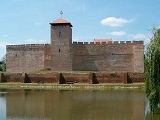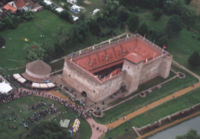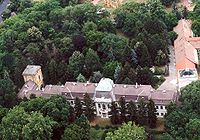
Gyula, Hungary
Encyclopedia



City
A city is a relatively large and permanent settlement. Although there is no agreement on how a city is distinguished from a town within general English language meanings, many cities have a particular administrative, legal, or historical status based on local law.For example, in the U.S...
in Békés
Békés (county)
Békés County , is an administrative division in south-eastern Hungary, on the border with Romania. It shares borders with the Hungarian counties Csongrád, Jász-Nagykun-Szolnok and Hajdú-Bihar. The capital of Békés county is Békéscsaba...
county in south-eastern Hungary
Hungary
Hungary , officially the Republic of Hungary , is a landlocked country in Central Europe. It is situated in the Carpathian Basin and is bordered by Slovakia to the north, Ukraine and Romania to the east, Serbia and Croatia to the south, Slovenia to the southwest and Austria to the west. The...
. It lies close to the border with Romania
Romania
Romania is a country located at the crossroads of Central and Southeastern Europe, on the Lower Danube, within and outside the Carpathian arch, bordering on the Black Sea...
, on the river Fehér-Körös
Crisul Alb
The Crişul Alb is a river in western Romania in the historical region of Transylvania and south-eastern Hungary . Its source is in the southern Apuseni Mountains. It flows through the towns Brad, Ineu, Chişineu Criş in Romania, and Gyula in Hungary...
.
History
The first recorded reference to Gyula was in a document dated 1313 which mentions a monastery called Gyulamonostor (Julamonustra in LatinLatin
Latin is an Italic language originally spoken in Latium and Ancient Rome. It, along with most European languages, is a descendant of the ancient Proto-Indo-European language. Although it is considered a dead language, a number of scholars and members of the Christian clergy speak it fluently, and...
). By 1332 the settlement around the monastery was being called Gyula / Jula. There are two versions for the origin of the name. One is that following the occupation of the Pannonian Plain by the Magyar tribes, the tribe of the gyula settled in the area. More likely is the version that a lord called Gyula or Jula founded the monastery and its settlement. During Ottoman rule, the town was a sandjak center as Göle or Küle in Tamışvar
Temesvar Province, Ottoman Empire
The Province of Temeşvar was a first-level administrative unit of the Ottoman Empire located in the Banat region of Central Europe. Besides Banat, the province also included area north of the Mureş River, part of the Crişana region. Its territory is now divided between Hungary, Romania, and Serbia...
eyalet
Eyalet
Eyalets were a former primary administrative division of the Ottoman Empire. The term is sometimes translated province or government. Depending on the rank of their commander, they are also sometimes known as pashaliks, beylerbeyliks, and kapudanliks.From 1453 to the beginning of the nineteenth...
.
Jewish history
The Holocaust in Hungary is commemorated in Gyula's Germantown at the building that housed the SynagogueSynagogue
A synagogue is a Jewish house of prayer. This use of the Greek term synagogue originates in the Septuagint where it sometimes translates the Hebrew word for assembly, kahal...
; one town among many that formed a once thriving Jewish community in Bekes
Békés
Békés is a town in Békés county, Hungary. It lies about north of Békéscsaba and east of Budapest.- History :The area of the present town has been inhabited since ancient times, due to its good soil and proximity to rivers. After Hungarians conquered the area, Békés and its surroundings were the...
county. Today, the Gyula Synagogue houses a music school and bears a plaque of remembrance dedicated to the memory of Gyula's Jewish community that perished in Auschwitz and other concentration camps.
Demographics
As of the Census of 2001, the town had 32,967 inhabitants; 94.2% Magyars, 2.3% RomaniansRomanians
The Romanians are an ethnic group native to Romania, who speak Romanian; they are the majority inhabitants of Romania....
, 1.6% Germans
Danube Swabians
The Danube Swabians is a collective term for the German-speaking population who lived in the former Kingdom of Hungary, especially alongside the Danube River valley. Because of different developments within the territory settled, the Danube Swabians cannot be seen as a unified people...
, 0.3% Slovaks
Slovaks
The Slovaks, Slovak people, or Slovakians are a West Slavic people that primarily inhabit Slovakia and speak the Slovak language, which is closely related to the Czech language.Most Slovaks today live within the borders of the independent Slovakia...
, 0.4% Roma
Roma minority of Hungary
Hungarian Roma, also known as Romani Hungarians, are Hungarian citizens or resident aliens in Hungary of Roma descent. They comprise between 2% and 6-11% of the total population...
and 1.2% other.
Gyula is a center for the small Romanian community of Hungary (2.3% of the inhabitants are ethnic Romanian).
Tourist attractions
To the east of the town centre stands the old fortress (13th century), now a cultural centre and a tourist attraction. Nearby, there are thermal spas known for their therapeutic effects.Nicolae Bălcescu High School, designed by Szabó Jen in an architectural style resembling that of Transylvanian wooden churches, is Hungary's only Romanian-language high school. Not very far is the Romanian Orthodox Cathedral, erected in 1867.
Gyula is home to Hungary's second oldest cake shop, and has a town centre comprising numerous small pedestrianised squares, many of which have large water fountains.
People
- Albrecht Dürer, Sr. (1427–1502), the father Albrecht DürerAlbrecht DürerAlbrecht Dürer was a German painter, printmaker, engraver, mathematician, and theorist from Nuremberg. His prints established his reputation across Europe when he was still in his twenties, and he has been conventionally regarded as the greatest artist of the Northern Renaissance ever since...
- Ferenc Erkel (1810–1893)
- Imre KönigImre KönigImre König aka Mirko Kenig was a Hungarian chess master.He was born in Gyula, Hungary, and also lived in Austria, England and the USA during the troubled times between the two world wars.In 1921, he took 2nd in Celje...
(1901–1992), chess player - George PomutzGeorge PomutzGeorge Pomutz was an ethnic Romanian officer during the Hungarian Revolution of 1848. He was a general in the Union Army in the American Civil War, and a diplomat.-Early life:...
(1818-1882), American diplomat and general
Twin Towns - Sister Cities
Gyula is twinnedTown twinning
Twin towns and sister cities are two of many terms used to describe the cooperative agreements between towns, cities, and even counties in geographically and politically distinct areas to promote cultural and commercial ties.- Terminology :...
with:
| Budrio Budrio Budrio is a town and comune in the province of Bologna, in Emilia-Romagna, Italy; it is located 15 km E of Bologna.Budrio has two high schools, including a lyceum, a post office, banks, a communal theatre, a swimming pool and several squares... in Italy Italy Italy , officially the Italian Republic languages]] under the European Charter for Regional or Minority Languages. In each of these, Italy's official name is as follows:;;;;;;;;), is a unitary parliamentary republic in South-Central Europe. To the north it borders France, Switzerland, Austria and... (since 1965) Zalău Zalau Zalău is the seat of Sălaj County, Transylvania, Romania. In 2004, its estimated population was 62,900.- Ancient times :Zalău is situated in the area inhabited by "Free Dacians", 8 kilometers away from the historical landmark of Porolissum, a well-preserved Roman Castrum with an imposing fortress,... in Romania Romania Romania is a country located at the crossroads of Central and Southeastern Europe, on the Lower Danube, within and outside the Carpathian arch, bordering on the Black Sea... (since 1991) Bălţi Balti Balti can refer to:* Balti language, a language spoken in Baltistan in Pakistan and Ladakh in Kashmir* Balti people, Muslims of Ladakhi/Tibetan origin from Baltistan in Pakistan and Ladakh in Kashmir... in Moldova Moldova Moldova , officially the Republic of Moldova is a landlocked state in Eastern Europe, located between Romania to the West and Ukraine to the North, East and South. It declared itself an independent state with the same boundaries as the preceding Moldavian Soviet Socialist Republic in 1991, as part... |
Ditzingen Ditzingen Ditzingen is a town in the district of Ludwigsburg, Baden-Württemberg, Germany. It is situated about 10 km northwest of Stuttgart, and 12 km southwest of Ludwigsburg. The Hirschlanden transmitter is located near Ditzingen-Hirschlanden... in Germany Germany Germany , officially the Federal Republic of Germany , is a federal parliamentary republic in Europe. The country consists of 16 states while the capital and largest city is Berlin. Germany covers an area of 357,021 km2 and has a largely temperate seasonal climate... (since 1991) Miercurea-Ciuc Miercurea-Ciuc Miercurea-Ciuc is the county seat of Harghita County, Romania. It lies in the Székely Land, an ethno-cultural region in eastern Transylvania, and is situated in the Olt River valley.The city administers three villages:* Ciba / Csiba... in Romania Romania Romania is a country located at the crossroads of Central and Southeastern Europe, on the Lower Danube, within and outside the Carpathian arch, bordering on the Black Sea... (since 1993) Arad Arad, Romania Arad is the capital city of Arad County, in western Romania, in the Crişana region, on the river Mureş.An important industrial center and transportation hub, Arad is also the seat of a Romanian Orthodox archbishop and features two universities, a Romanian Orthodox theological seminary, a training... in Romania Romania Romania is a country located at the crossroads of Central and Southeastern Europe, on the Lower Danube, within and outside the Carpathian arch, bordering on the Black Sea... (since 1994) |
Krumpendorf in Austria Austria Austria , officially the Republic of Austria , is a landlocked country of roughly 8.4 million people in Central Europe. It is bordered by the Czech Republic and Germany to the north, Slovakia and Hungary to the east, Slovenia and Italy to the south, and Switzerland and Liechtenstein to the... (since 1995) Schenkenfelden Schenkenfelden Schenkenfelden is a municipality in the district of Urfahr-Umgebung in Upper Austria, Austria.-References:... in Austria Austria Austria , officially the Republic of Austria , is a landlocked country of roughly 8.4 million people in Central Europe. It is bordered by the Czech Republic and Germany to the north, Slovakia and Hungary to the east, Slovenia and Italy to the south, and Switzerland and Liechtenstein to the... (since 1997) Droitwich in United Kingdom United Kingdom The United Kingdom of Great Britain and Northern IrelandIn the United Kingdom and Dependencies, other languages have been officially recognised as legitimate autochthonous languages under the European Charter for Regional or Minority Languages... (since 2001) |

